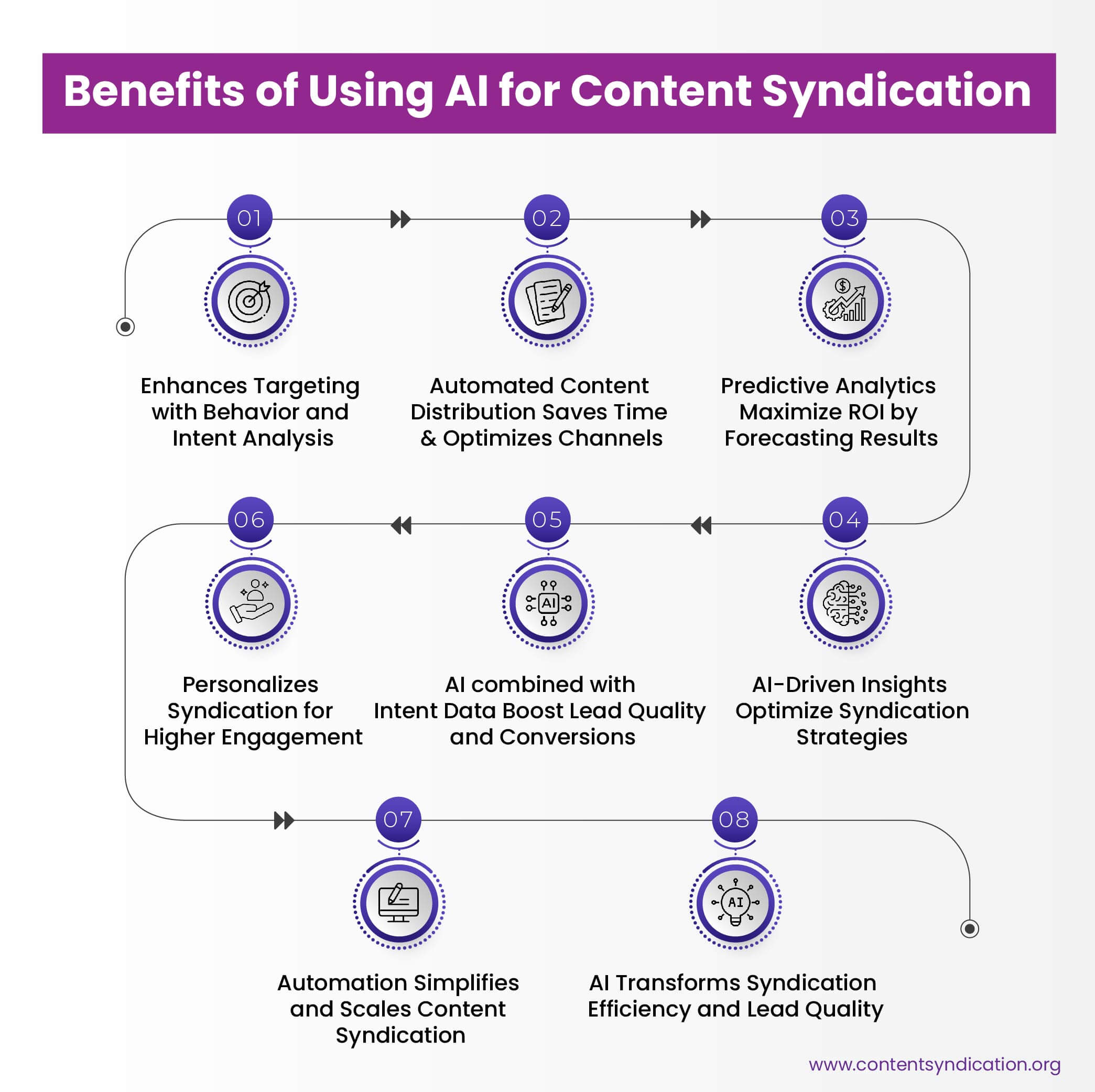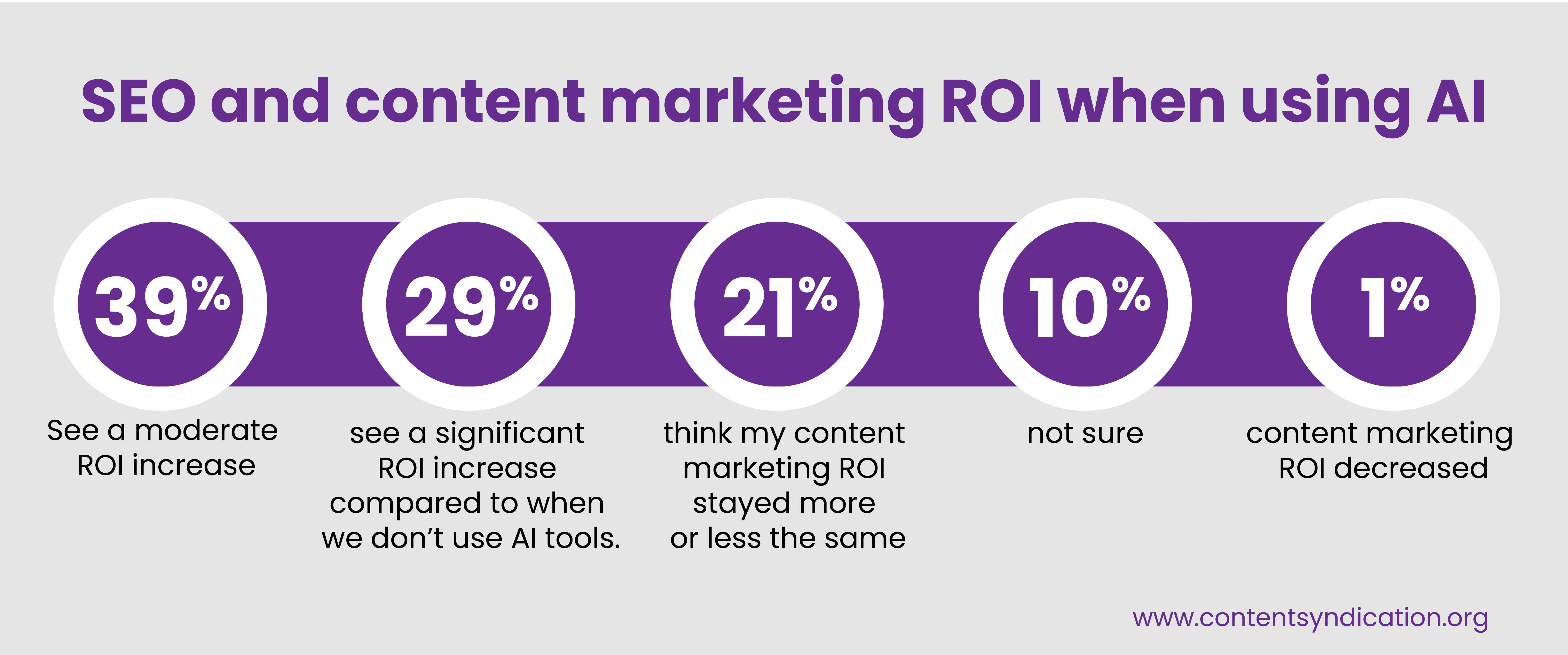Content marketing is undergoing big changes with the advent of AI, offering brands a way to distribute their message across a broad array of platforms.
Traditional syndication often lacks..
Precision. Personalization, and scalability.
But this is what today’s increasingly sophisticated audience demands.
According to a Forrester report, 62% of B2B marketers are planning to invest in AI-powered marketing technologies in the next 12 months.
But why exactly are marketers making this shift?
The Evolving Role of Content Syndication
Content syndication is simply about getting content in front of as many eyes as possible.
Sure, this strategy can increase visibility. But the real problem arises when it often fails to generate meaningful engagement or leads.
That’s likely because you are casting too wide a net, resulting in low-quality leads and missed conversion opportunities.
AI is changing that. How?
Instead of distributing content broadly, AI analyses user data—such as browsing behaviour, intent signals, and demographics—to deliver more personalized content to the right audience, at the right time.
This way, you can shift from a mass-distribution tool to a finely tuned, targeted approach.
McKinsey reports that AI-driven personalization can achieve up to 40% higher conversion rates compared to traditional methods, and personalization can drive revenue growth by 10-15%.
So, if you want to hit the bull’s-eye, AI is the go-to tool. It tailors content to individual needs, making it essential for marketers aiming to increase engagement and conversions.
Now, coming to the point…
Must Read: What is Content Syndication?

Why AI is Gaining Momentum in Content Syndication
“AI is often thought to be only for large enterprises with vast resources, and small and medium-sized businesses supposedly can’t afford it. However, today AI is accessible to all. Many free content syndication platforms now integrate AI-driven features that don’t require specialized knowledge. AI Tools for Content Syndication in 2025 are increasingly focused on accessibility and efficiency, enabling businesses to leverage advanced technology without significant overheads.
These tools can automatically analyze audience engagement, content performance, and real-time data to optimize content distribution, making AI both user-friendly and scalable.
According to Gartner, 75% of B2B marketers who leverage AI for content personalization see an improvement in engagement metrics, including a 33% increase in click-through rates.
Furthermore, HubSpot reveals that using AI to optimize content distribution can increase lead generation by 50% and reduce distribution costs by up to 30%.
In this sense, AI is not a luxury but a necessity for businesses of all sizes. With the right tools, even mid-sized companies can compete with larger enterprises by improving efficiency and outcomes.”
AI in Demand Generation: Beyond Lead Volume
AI-driven content syndication directly fuels demand generation strategies. Instead of casting a wide net, AI narrows focus on high-intent accounts by analyzing firmographics, behavior, and intent signals. This results in stronger marketing-qualified leads (MQLs) and a healthier sales pipeline. By aligning marketing with sales, AI syndication ensures faster revenue generation.
AI Enhancing Targeting and Audience Segmentation
Another common myth is that AI-based targeting is only about identifying the right keywords. While keywords are essential, relying solely on them limits a campaign’s potential.
Human-led keyword analysis often overlooks valuable behavioral patterns, such as purchasing intent and engagement metrics, which can significantly improve targeting accuracy.
AI takes audience segmentation to the next level by analyzing vast amounts of data from various sources—such as CRM systems, social media, and website analytics—to identify behaviors and intent signals.
This allows marketers to target specific audience segments more effectively, ensuring the content they distribute is relevant and timely.
AI doesn’t just target keywords—it targets behaviors and intents. With AI, content syndication evolves into a strategy that speaks directly to the evolving needs of your audience, increasing relevance and boosting engagement.
AI-Powered Content Distribution Channels
Some marketers worry that relying on AI for content distribution might limit their creative control. They fear that AI may replace the nuanced strategies that only humans can bring to the table, potentially leading to a less personalized or creative approach.
In reality, AI enhances creativity rather than stifles it. By automating repetitive tasks like performance tracking, A/B testing, and channel selection, AI frees marketers to focus on what they do best—crafting compelling, high-quality content.
AI makes sure that the right content is delivered through the most effective channels, but the creative vision remains entirely in the marketer’s hands.
In fact, LinkedIn’s 2024 Marketing Report shows that 76% of marketers using AI-powered tools for content syndication saw a 2x increase in qualified lead generation within the first year.
Must Read: Choosing the Right Content Syndication Network: What Should You Look For?
Tracking ROI: Metrics That Matter in AI Syndication
AI makes content syndication measurable at every stage. Marketers can track CPL, lead-to-MQL conversion rates, pipeline velocity, and account-level engagement. Predictive models also highlight which campaigns are likely to deliver the best returns. The focus shifts from volume (“How many leads?”) to value (“How many high-intent accounts entered the pipeline?”). By reframing ROI this way, AI syndication proves clear business value.
AI for Performance Tracking and Optimization
Some marketers mistakenly believe that AI-driven content syndication is a “set-it-and-forget-it” solution. They assume that once AI is implemented, it will continuously drive results without any further input or optimization.
This isn’t the case. While AI automates many tasks, it still requires continuous monitoring and optimization to ensure peak performance. AI provides real-time performance tracking, allowing marketers to monitor engagement, conversions, and other key metrics across multiple channels. With these insights, marketers can adjust their strategies in real-time to improve outcomes.
According to Salesforce, B2B marketers using AI to track content performance can optimize campaigns 20% faster, improving ROI by 35%. By automating A/B testing and offering real-time data, AI enables marketers to continuously refine their campaigns based on actual performance rather than assumptions or predictions.

Challenges and Ethical Considerations in AI Syndication
While AI offers clear advantages, it also raises challenges. Privacy compliance (GDPR, CCPA), algorithmic bias, and content authenticity are concerns marketers must address. The best approach is responsible AI use—ensuring transparency, maintaining human oversight, and balancing automation with authentic messaging. This helps businesses unlock AI’s potential without compromising trust.
Future Trends in AI-Powered Content Syndication
Hyper-Personalization with Machine Learning
AI will refine personalization beyond demographics, delivering content tailored to individual decision-makers.
AI + ABM Integration for Account Targeting
Expect deeper integration with account-based marketing, ensuring the right content reaches the right accounts at the right time.
Predictive Delivery and Timing
AI will optimize when content is delivered, predicting the exact moment a prospect is most likely to engage.
AI-Assisted Content Repurposing
AI tools will make it easier to repurpose whitepapers, blogs, and webinars into multiple formats for broader syndication.
Conclusion: The Future of Content Syndication is AI-Driven
Content syndication is key to a successful content syndication strategy, but it can be time-consuming and challenging.
By automating tedious tasks, providing deep audience insights, and optimizing content distribution in real-time, AI empowers marketers to focus on creating engaging, high-value content.
In a nutshell, the future isn’t just about distributing content; it’s about distributing the right content to the right people at the right time. And AI is the key to making that happen. So, let’s bring AI into content syndication and maximize the impact of your content!
How to Get Started with AI Content Syndication
- Define your audience and goals.
- Choose AI-powered syndication tools.
- Distribute content across the right platforms.
- Track key metrics like CPL, MQL conversion, and pipeline impact.
- Continuously optimize with real-time AI insights.
Frequently Asked Questions (FAQ)
What is AI-powered content syndication?
AI-powered content syndication uses artificial intelligence tools to automate and optimize the process of distributing marketing content across multiple platforms. AI analyzes audience behavior, engagement patterns, and intent signals to deliver the most relevant content to the most appropriate channels, boosting reach, engagement, and lead quality.
Why are marketers shifting to AI for content syndication?
Because traditional syndication often lacks precision, personalization, and scalability. AI solves these problems by:
- Identifying high-intent prospects
- Automating distribution
- Personalizing content delivery
- Optimizing in real time based on performance data
This leads to higher ROI, better lead quality, and lower operational costs.
Is AI for content syndication only for large enterprises?
Not anymore. Many affordable and accessible AI tools are now available for small and medium-sized businesses. Platforms like HubSpot, Outbrain, and even free AI-powered SEO plugins allow brands of all sizes to take advantage of AI in their content strategies.
Does using AI mean losing creative control?
Not at all. AI automates routine and repetitive tasks like audience targeting, A/B testing, and performance tracking. This gives marketers more time and space to focus on strategic messaging, storytelling, and content quality—enhancing creativity rather than restricting it.
How does AI help with audience segmentation?
AI analyzes large datasets from CRM tools, web analytics, social platforms, and behavioral patterns to identify and segment audiences based on:
- Buying intent
- Engagement history
- Demographics
- Content preferences
This enables marketers to send highly targeted and timely content, increasing relevance and engagement.
Can AI actually improve lead quality through syndication?
Yes. According to LinkedIn’s 2024 Marketing Report, 76% of marketers using AI for content syndication doubled their qualified leads within a year. By targeting content more effectively and analyzing user behavior in real time, AI improves both quantity and quality of leads.
What AI tools are used in content syndication?
Some popular tools include:
- HubSpot – AI-driven marketing automation
- PathFactory – Content engagement tracking and recommendation
- Drift & 6sense – For intent data and predictive analytics
- Outbrain & Taboola – AI-optimized native content distribution
- ChatGPT – For repurposing and rewriting content formats
Does AI require constant oversight?
Yes. While AI automates and accelerates processes, it’s not a “set-it-and-forget-it” tool. Continuous monitoring, testing, and optimization are required to refine targeting, update messaging, and improve campaign results based on real-time data.
How does AI track content performance?
AI tools monitor KPIs such as:
- Click-through rate (CTR)
- Conversion rate
- Time on page
- Lead engagement scores
- Source-based referral traffic
These insights help marketers adjust distribution strategies in real time and improve ROI by focusing on what’s working.
What’s the future of content syndication with AI?
The future is precision-driven, real-time, and hyper-personalized. AI will become integral in:
- Voice search optimization
- Automated content repurposing
- Predictive content delivery
- Intent-based audience targeting
AI will enable brands to cut waste, boost conversions, and scale with confidence.




